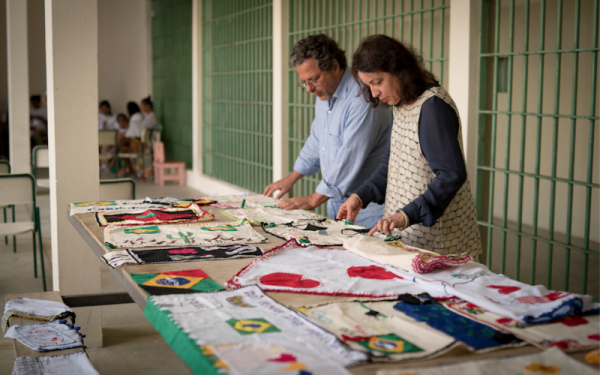Few were the times when a frisson was interpreted as a good sign within the boundaries of the Women’s Penitenciary of Tremembé, in the state of São Paulo. The first week of workshops for teaching inmates manual arts, a project lead by the Humanitas360 Institute, took place between June 11th and June 15th. It changed the routine of the participating inmates, who responded to the initiative with an unfamiliar excitement to the prison’s strict rules. Inside the working room, sewing machines cobbled together the first product prototypes, embroideries were removed from frames to compose new pieces and woolen flowers decorated the desk of crocheters.
To the sound of mid-2000s hit by MC Leozinho, “Se ela dança eu danço” – performed by Renato Imbroisi, handicrafts expert who is teaching the detainees – they embroidered, cut fabric, stitched and crocheted with the same joy “of those who are not living inside of a prison”, as one of the coop’s participants, Gisele, pointed out. Since April 2018, H360 has been implementing the coop in the small town of Tremembé – symbolizing the second cooperative of detainees to be created in Brazil, having more than 30 participants.
During the time away from the prison cells, the prisoners stay focused on learning the skills shared by tutors, such as the designer Cristiana Barretto and the artist Paulo Von Poser. They also learn about the artistry from voluntary seamstresses Camilla and Sônia. Older than most of the participants, Luzinete, 56, embroiders flowers with the easiness of a legitimate professional: “I had never done any embroidery before….I am one of those old ladies who did not know how to sew, until this week,” she says. “I just never imagined that I would learn such thing inside of a prison.”
The focus of attention switches only when the president of H360, Patrícia Villela Marino, pays a visit to the detainees. Flávia Maria, a leader among the group, said: “We need more examples of successful women and she is a reference, a source of inspiration.” The past of these women tend to be difficult. Cases of domestic violence and abandonment are common, as well as mistreatment in childhood, early pregnancy and the need to contribute to family income since adolescence. The involvement with crime is often passed on by fathers, brothers, boyfriends, and other male family members.
“I am the daughter of a warrior, who was a mother to me and to my children,” said Tânia, also the daughter of a drug addict who died at 35 of HIV. She was caught by police with a warrant of arrest more than two years after dropping off crime. Pregnant from her third child, she was taken to jail in January 2015, while her youngest daughter, Victoria, was asleep. “Before I was taken away I looked at Victoria, sleeping, and thought that I would not be there when once she’d woken up.”
So the importance of cooperatives go far beyond awakening an entrepreneurial spirit in the participants and teaching them manual arts for a better future. The coops make days behind bars far less tortuous: “In the cooperative, I feel free,” said Viviane. Many see in this opportunity a chance to start over, especially when it comes to motherhood: “It got to a point where I thought everything was over, that I would be forever labelled as an ex-detainee and could never be a mother worth of educating my children,” said Tania. But since she started taking part in the workshops, her perspective has changed: “Now I have will power to change my story, fight and win.”
The first week of workshops ended with a small celebration with cake, finger food and soft drinks, something which most of the inmates had not tasted in years. Just a closing ritual, but it provided them with a brief taste of freedom. State which is even more desired now, with the promise of more prosperous days away from crime and close to those they wished they had never left in the first place.





